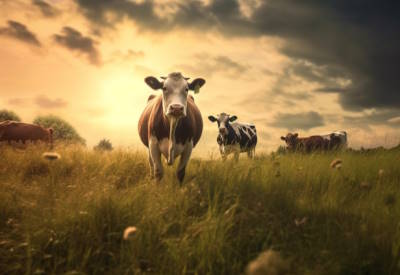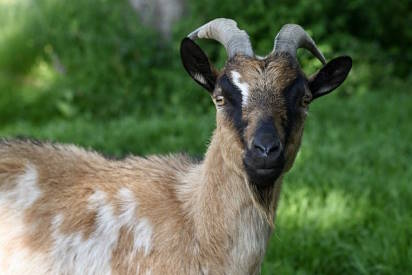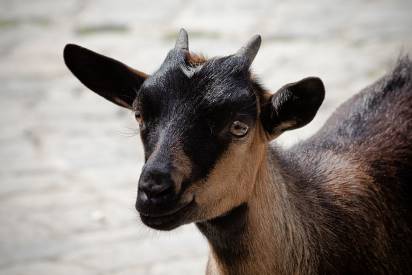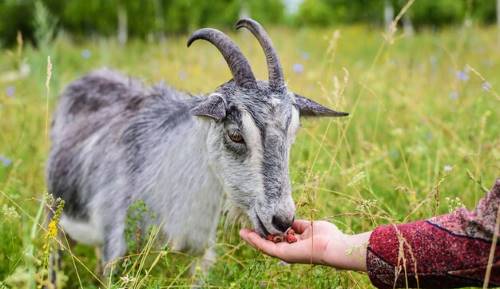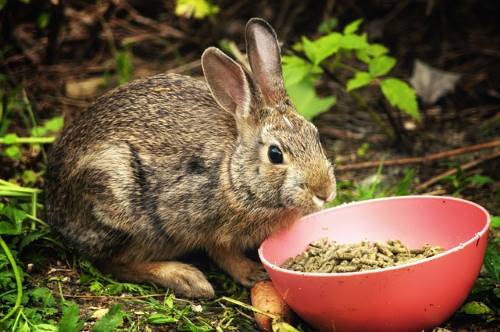Can goats eat cow feed? That’s the question that popped into my mind one sunny afternoon as I watched my herd of playful goats frolic around the barnyard, eyeing the pile of cow feed I’d accidentally left out. It might sound like a straightforward question, but as I’ve come to find out, it requires a deeper dive than you’d expect.
Growing up on a farm, I’ve always been surrounded by an array of animals, each with their distinct personalities and, more importantly, distinct dietary needs. And while it might be tempting to think of farm animals as having a one-size-fits-all diet, this assumption can lead to health complications for our beloved creatures.
In the journey of responsible animal husbandry, understanding the specifics of what each animal should and shouldn’t consume is paramount. So, let’s dive into this question together, exploring the ins and outs of goat and cow nutrition and ultimately deciding if our caprine friends can safely munch on cow chow.
Understanding the Basics of Goat and Cow Nutrition
Let’s kick things off by getting familiar with the dietary intricacies of both goats and cows. Like humans, each species has its own set of unique nutritional requirements, and understanding these basics sets the foundation for our deep dive into the main question at hand.
Dietary Needs of Goats
Goats, especially the ones bred for meat, milk, or fiber, have specific dietary needs that must be met to maintain their health and productivity. Typically, they require a balanced combination of proteins, carbohydrates, vitamins, and minerals.
The goat’s menu often includes pasture, hay, grains like corn, oats, and barley, as well as specially formulated goat feeds.
Dietary Needs of Cows
Cows, especially those bred for milk or beef, have robust nutritional demands. They thrive on a diet rich in energy, proteins, vitamins, and minerals.
A cow’s typical plate may feature hay, grains, legumes, and sometimes, grazing pasture.
[GoatAffiliate]
Key Ingredients Found in Cow Feed
Next on our list, let’s delve into what goes into that bag of cow feed at your local store. If you’re a curious goat owner pondering the cow feed question, it’s good to get a grip on these ingredients.
Grains and Seeds
- Corn, oats, and barley: These grains are energy-packed staples in cow feed. They provide the necessary calories and are pivotal for cows that are either lactating or being raised for beef.
- Importance in a cow’s diet: Grains, when processed right, are easier for cows to digest and help in muscle building and milk production.
Forages
- Alfalfa, clover, and hay: These are vital for a cow’s digestion. They provide the roughage cows need and are full of essential nutrients.
- Benefits for bovine digestion: Forages aid in the slow release of energy, which is crucial for a cow’s rumination process.
Supplements and Additives
- Minerals, vitamins, and proteins: These are often added to cow feed to meet their specific needs, especially if the primary feed lacks any.
- Purpose in promoting cow health: Additives can support bone health, milk production, and overall vitality.
Potential Concerns When Feeding Goats Cow Feed
Alright, now that we’re equipped with knowledge about cow feed ingredients, let’s focus on what could go wrong if Mr. Goat munches on it.
Nutritional Imbalances
Cows and goats have different nutritional needs. For instance, what might be a high-protein mixture suitable for a lactating cow could overwhelm a goat’s system. Any pet owner knows how distressing digestive issues can be. Goats have sensitive stomachs, and a sudden switch or inappropriate diet can lead to complications.
While goats and cows are both ruminants, the way they process food can vary. Cows might be okay with certain grains in larger quantities, whereas goats may struggle.
Presence of Harmful Additives
Sometimes, cow feeds contain additives like ionophores to boost weight gain and prevent certain illnesses. These are toxic to goats and can cause severe health issues. Even if given unintentionally, these additives can pose threats to a goat’s health.
Benefits of Giving Goats Specially Formulated Goat Feed
With those potential concerns in mind, it makes sense to wonder: why not just stick to the goat feed? And here’s why that might be the best idea.
Tailored Nutrition
Goat-specific feeds are designed with the goat’s nutritional needs in mind. They provide just the right balance, ensuring your goats are neither underfed nor overfed.
Optimal Digestive Health
With ingredients tailored for a goat’s digestive system, the chances of gastric distress are minimized. A well-fed goat is a happy goat. By providing a diet tailored to their needs, you’re ensuring they are healthier, produce better quality milk or fiber, and have a good reproductive rate.
Practical Tips for Goat Owners Considering Cow Feed
If you’re still contemplating the cow feed avenue, here are some golden nuggets to take home.
When and How to Introduce Cow Feed
- Gradual introduction: If you’re considering introducing cow feed, do it slowly. Start by mixing it in tiny amounts with their regular feed.
- Monitoring for any signs of distress: Always observe your goats after changing their diet. Any signs of distress or illness should be a cause for concern.
Mixing Cow Feed with Goat Feed
A general rule is not to let cow feed exceed 10% of the goat’s total diet. But always consult with a vet or a livestock nutritionist. Even if mixing, ensure the overall feed meets the goat’s nutritional requirements.
Alternatives to Cow Feed for Goats
- Sourcing goat-specific feeds: There’s no harm in sticking to the tried and tested. Goat feeds are widely available and are tailored for them.
- Homemade feed options and recipes: If you’re into the DIY spirit, there are tons of recipes online for homemade goat feeds that are both nutritious and delicious (well, for the goats, at least).
What Other Animal Feeds Can Goats Eat Apart from Cow Feed?
It’s not just cow feed that raises eyebrows among goat owners. With a medley of animals often sharing space on farms or households, it’s common to wonder if goats can cross-dine on feeds meant for other animals. Let’s gallop, hop, and trot through some other feeds and see if they make the cut for our caprine buddies.
Chicken Feed
While chickens and goats may be pasture pals, their feed isn’t exactly interchangeable. Chicken feed, especially the laying type, contains extra calcium meant for eggshell production.
This excess calcium isn’t ideal for goats, especially males, as it could lead to urinary calculi, a painful condition. It’s best to keep your goats pecking elsewhere for snacks.
Read More: Can Goats Eat Chicken Feed: Why It’s Not A Good Idea
Dog Food
Dogs might be man’s best friend, but their food isn’t a goat’s best meal. Dog food is formulated specifically for canine nutrition and may have elements that aren’t digestible or suitable for goats.
Regular consumption can lead to imbalances and potential health issues. So, while a curious nibble won’t necessarily harm them, it’s not something you’d want to make a routine.
Read More: Can Goats Eat Dog Food: Why It’s Not A Good Idea
Horse Feed
Here’s where things get a tad closer to the mark. Horse feed and goat feed have some similarities, as both animals have herbivorous diets. However, there’s a catch. Horse feeds might contain additives or molasses in quantities not suitable for goats.
While it’s not the worst feed for a goat to consume occasionally, it shouldn’t be a staple.
Read More: Can Goats Eat Horse Feed? Simple Answer & Feeding Tips
Rabbit Food
Rabbits, with their herbivorous nibbling, do have dietary overlaps with goats. The pellets that bunnies munch on are primarily hay-based and might seem like a harmless treat for goats. However, rabbit food is typically lower in vitamins and minerals essential for goats.
It’s okay in a pinch or as an occasional treat but shouldn’t replace goat-specific nutrition.
Read More: Can Goats Eat Rabbit Food? Simple Answer & Feeding Tips
Cat Food
Cats are obligate carnivores, meaning their diet is meat-heavy. This makes cat food a big no-no for goats. The protein content, nutrients, and overall formulation of cat food are entirely out of sync with what a goat needs.
Even occasional consumption could lead to digestive issues. It is best to keep the kitty kibble for the feline family members.
Read More: Can Goats Eat Cat Food? Unraveling The Barnyard Diet Mystery
Can goats eat cow feed – final thoughts
So, after diving into the whirlwind world of ruminant diets, where do we stand on our burning question: can goats eat cow feed? The answer, my friends, is more layered than a farm-fresh lasagna. While goats might fancy a nibble or two of that cow chow, it doesn’t mean it’s the main course they should be dining on regularly.
Navigating the landscape of livestock nutrition can feel like herding cats at times, but remember, it’s all in a day’s work for the passionate farmer. With our trusty goats jumping around, it’s essential to keep their tummies happy and health in check. So, next time they cast longing eyes at that bag of cow feed, toss them some specially formulated goat goodies instead and keep the moo-munchies for the cows!
Related Articles:

